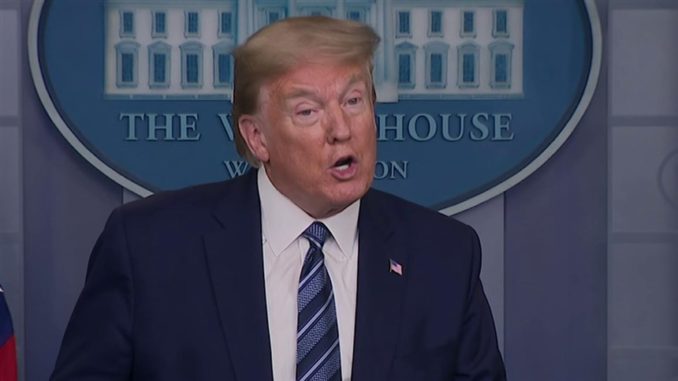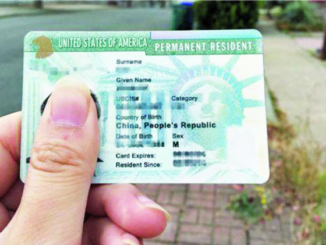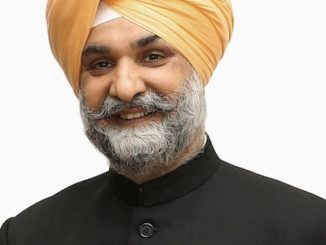
I.S. Saluja
WASHINGTON (TIP): U.S. President Donald Trump, April 22, signed an executive order pausing immigration for 60 days to protect the jobs of Americans laid off due to the COVID-19 pandemic.
The temporary suspension of immigration will affect those who are legally seeking entry into the United States for employment purposes but not the ones who are already living in the country, the order said.
The order is effectively a restriction on entry that applies to people outside the U.S. seeking lawful permanent residency, which grants people the right to live and work in the U.S. and is a mandatory steppingstone to citizenship for all types of immigrants.
It affects people applying for green cards through employment, family or other means, with some significant exceptions.
Describing it as a very powerful order Trump told reporters during his daily news briefing at the White House on Wednesday, April 22, that he signed the order before coming for the press briefing.
“By pausing immigration, we’ll help put unemployed Americans first in line for jobs as America reopens. It would be wrong and unjust for Americans laid off by the virus to be replaced with new immigrant labor flown in from abroad,” he said.
He also said it will “preserve our healthcare resources for American patients” afflicted by the coronavirus.
The executive order, a copy of which was released by the White House, said the new provisions apply to foreign nationals outside the U.S. who do not have an immigrant visa that is valid on the effective date of proclamation.
It also applies to those foreign nationals who do not have an official travel document other than a visa that is valid on the effective date of proclamation or issued on any date thereafter that permits him or her to travel to the U.S. and seek entry or admission.
The suspension, the executive order said, does not apply to those foreign nationals already inside the country on a green card. It provides exemptions to healthcare workers, and those seeking to enter the U.S. as a legal permanent resident under investment category. Spouses of a U.S. citizen, 21 years and younger kids of American nationals, or those who are under the process of being adopted are also exempted from this temporary suspension of immigration.
Trump said he was determined that, without this measure, the U.S. faces a potentially protracted economic recovery with persistently high unemployment if labor supply outpaces labor demand.
Excess labor supply affects all workers and potential workers, but it is particularly harmful to workers at the margin between employment and unemployment, who are typically ‘last in’ during an economic expansion and ‘first out’ during an economic contraction, he said in his executive order.
In recent years, these workers have been disproportionately represented by historically disadvantaged groups, including African Americans and other minorities, those without a college degree, and the disabled, he said. These are the workers who, at the margin between employment and unemployment, are likely to bear the burden of excess labor supply disproportionately, he added.
The White House in a statement said that this is a temporary pause demanded by the crisis being faced as a nation. The pause will be in effect for 60 days, and the administration will continue to monitor the labor market to amend or extend the proclamation if needed, it said.
Trump is also asking his administration to review guest worker programs to assess whether additional measures should be taken to protect American workers. The White House further said that mass migration of low-skilled labor into the U.S. disproportionately harms historically disadvantaged Americans.
Trump said this week he would impose a more sweeping order, saying he intended to close the United States to people trying to immigrate to the country to live and work. But under intense pressure from business groups, he backed off barring guest workers for technology companies, farms as well as other employers. Still, some business groups said they were frustrated by the move.
Some critics see Republican Trump’s announcement as a move to take advantage of the coronavirus crisis to implement a long-sought policy goal of barring more immigrants ahead of the November 3 election
Trump won the White House in 2016 in part on a promise to crack down on immigration and has made the issue central to his presidency. But many of his major moves trying to curb immigration have been challenged in court and legal experts said this executive order could also face lawsuits.
One U.S. Department of Homeland Security official who requested anonymity said the order would only apply to people applying for permanent residence from outside the United States, not those already in the country seeking to adjust their status.
A person familiar with the internal debate at the White House said Trump and his advisers had discussed the executive order over the weekend and that the move was directed at his electoral base.
White House lawyers worked all day to craft the language for the order, prompting some officials to say the signing might have to wait for April 23. But aides described Trump as eager to sign the document.
“He’s wanted this all along,” the person said. “But now under this pandemic he can absolutely do it.”
(With input from agencies)





Be the first to comment